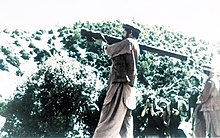Mujahed

The term mujahed ( Arabic مجاهد Mudschahid , DMG Muǧāhid , fighters', nominative plurality Mudschāhidūn and genitive / accusative Mudschahidin ), as well as the term Dschihad of dschāhada /جاهد / 'To strive, strive, fight', derived and translated into German means "someone who practices jihad". He becomes v. a. often inaccurately translated in the mass media as a warrior of God .
The word is used in connection with Islam and then usually denotes Islamist fighters or Islamist guerrilla groups. Islamic resistance fighters and terrorist groups call themselves mujahedeen . The form mujahideen is also often used. In addition, in Persian , which also includes the Dari in Afghanistan , the short i becomes e and the short u becomes o. Since the term became popular in the West during the war of Islamic fighters against the Soviet Union in Afghanistan , the variant with Persian pronunciation widespread.
The term can also refer more generally to people who strive to spread or defend Islam or who individually strive to “follow God's way”. In this sense, someone who studies his or her faith (e.g. Islam) and lives this clear conscience can be a mujahedd.
Mujahideen in Afghanistan
The various guerrilla groups who fought in Afghanistan from 1979 to 1989 against the Soviet troops and the communist government they supported ( Soviet intervention in Afghanistan ) called themselves mujahideen . They received financial and material support mainly from the United States , Pakistan and Saudi Arabia . The arms deliveries and the training of many fighters were mainly organized by the US secret service CIA and the Pakistani secret service ISI . The CIA, in cooperation with the Maktab al-Chadamāt , invested several billion US dollars in the Islamist insurgents as part of the covert Operation Cyclone . After the withdrawal of the Soviet troops in 1989, civil war broke out between the various mujahideen groups.
In order to spur resistance against the Soviet occupation in Afghanistan, the United States invested several million dollars in textbooks that glorify violence. With the help of these books, which were filled with depictions of violence, Islamist teachings and Koran verses taken out of context , the Afghan schoolchildren were introduced to the doctrine of jihad (holy war). These books were also used in teaching in camps for Afghan refugees in Pakistan. The Taliban also used the books produced by the USA. To bring the books in line with their ideology of prohibiting images, the human faces were cut out.
Mujahedin in Iran
Mujahideen in the Yugoslav Wars
Foreign volunteers, mostly former Afghanistan fighters , also fought in the Bosnian War as so-called mujahedin ( mudžahedin ) on the side of the Bosnian Muslim armed forces from 1992 onwards.
During the Bosnian War there were numerous atrocities committed by the Mujahideen , among others under the leadership of the Supreme Commander of the Bosnian Army , Rasim Delić , against Serbs and Croats in central Bosnia and the region of Ozren . Under the orders of Osama bin Laden , al-Qaeda supporters fought with the Bosnian army on the front lines throughout the war.
literature
- Robert D. Kaplan: Soldiers of God. With Islamic Warriors in Afghanistan and Pakistan . Vintage Books, New York 2001, ISBN 978-1-4000-3025-5 .
Web links
Remarks
- ↑ The form of mujahideen , emphasized on the penultimate syllable, is a form widely used by journalists that grossly contradicts both the Arabic and Persian pronunciation, since in neither of the two languages the word is stressed on the penultimate syllable, but on the third from the last ( Arabic) or the last (Persian). There is nowhere a doubling of the d. The editors of the Dudens recommend the spelling “Mujahedin” without double d.
Individual evidence
- ↑ Hans Wehr : Arabic dictionary for the written language of the present , fourth edition, Beirut and London 1976, page 128.
- ↑ a b From US, the ABC's of Jihad, in: Washington Post of March 23, 2002, accessed via Global Issues on September 30, 2014 (English)
- ↑ Die Zeit : School of Hatred in the Balkans - How bin Laden's Al-Qaida gained a foothold in Bosnia